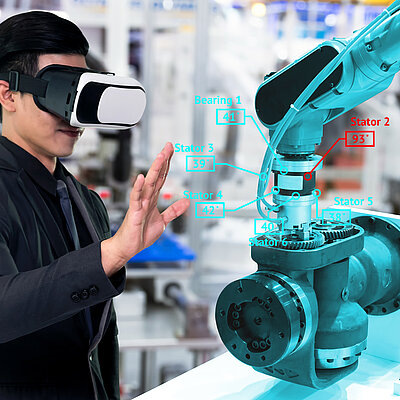
Human Machine Cooperation (HMC)
Which technical innovations are relevant for humans? And how can humans meaningfully cooperate with machines to ensure that tasks are carried out better overall?
In addition to this, a key question is how humans can meaningfully cooperate with machines to ensure that tasks are carried out better overall. Both humans and machines can contribute to fi nd a solution. Good illustrations of this can be found in medicine. When carrying out diffi cult operations, for example on the human brain, virtual assistance systems can be used to provide the surgeon with important additional information – where exactly is the tumor; where are critical constrictions that require particular care?
In the intensive care, machines handle monitoring of patients’ vital signs, with medical personnel reacting accordingly. Empirical studies have, however, shown that numerous visual and acoustic alarm signals can be problematic since it is rarely necessary for personnel to actually intervene. In such cases the flow of information in not helpful but rather can be dangerous because it causes over-familiarization. A mere parallel existence of humans and machines can thus lead to a negative outcome. Human-machine cooperation is a better option, with the machines condensing information to generate a useful overall picture from many single parameters. Intuitive displays could then enable nursing personnel to quickly recognize whether patients are doing well or not.
Interactive systems are already being used in many diff erent environments today. In transportation modes such as cars, planes, or ships; in devices such as smartphones, tablets, or wearables; and in control rooms and voice-controlled devices. Conventional input and output modalities such as keyboards or monitors are increasingly being replaced by so-called »multimodal user interfaces« that incorporate multiple sensory channels. Intelligent assistants facilitate contextsensitive use and interaction with real objects in our daily environment. Ambient lighting can, for example, today be controlled using a smart device; acoustic signal, or voice command.
Depending on the application context, human-machine interaction and cooperation is subject to specifi c requirements regarding fitness for purpose; user-friendliness; acceptance; robustness; and security. Correspondingly, the Human Machine Cooperation competence cluster uses a variety of analysis, development, and evaluation methods to design and validate interactive or cooperative systems. Application focuses are, for example, assistive systems in vehicles, ships, healthcare, medicine, and personal health.
Persons 
A
E-Mail: larbi.abdenebaoui(at)offis.de, Phone: +49 441 9722-730, Room: Flx-S
E-Mail: PedroFernando.ArizpeGomez(at)offis.de, Phone: +49 441 9722-741, Room: E66
B
E
E-Mail: marco.eichelberg(at)offis.de, Phone: +49 441 9722-147, Room: E46
G
H
I
K
L
M
N
S
E-Mail: Tim.Stratmann(at)offis.de, Phone: +49 441 9722-431, Room: Flx-P
Projects 
2025
EduMind – An AI-powered tutoring module for digital learning platforms: Personalized, real-world learning content guided by teachers’ didactic expertise
Duration: 2025 - 2026
Spielerische Therapieunterstützung mit adaptivem Realitätsgrad für Kinder
Duration: 2025 - 20282024
Eine interaktive Entscheidungshilfe zur gezielten Platzierung von automatischen Defibrillatoren für die Lebensrettung bei Herz-Kreislaufkollaps
Duration: 2024 - 20262023
Soziale Präsenz durch immersive, emotionale und lebendige Erfahrungen von Nähe auf Distanz
Duration: 2023 - 20262022
DIGItal TechnOlogies for Participation and InterAction in Society - Digital Technologies for Participation and Interaction in and with Society
Duration: 2022 - 2026
Development of a smart analysis platform supported by augmented reality
Duration: 2022 - 2024
Haptic Tablet For The Accessibility of Digital Content to the Visually Impaired
Duration: 2022 - 2025 Publications 
2025
Fischer, Uwe and Bartling, Mona and Wolters, Maria K.; Resuscitation; October / 2025
Woźniak, Mikołaj P. and Walczak, Anna and Grudzień, Krzysztof and Müller, Heiko and Borchers, Jan and Koelle, Marion and Boll, Susanne; International Journal of Human-Computer Studies; September / 2025
Salous, Mazen and Riecken, John-Uwe and Heuten, Wilko and Abdenaboui, Larbi; Technology for Inclusion and Participation for All: Recent Achievements and Future Directions; 2025
Chamunorwa, Michael and Müller, Heiko and Boll, Susanne; Proceedings of the ACM on Human-Computer Interaction; September / 2025
Celia Nieto Agraz, Tabea Tschigor, Samuel Orwoll, Tobias Krahn, Andreas Hein; PPZ Berlin 7. Clusterkonferenz 2025; März / 2025
Grimme, Sophie and Spoerl, Susanna Marie and Jung, Frederike and Koelle, Marion; Proceedings of the 2025 CHI Conference on Human Factors in Computing Systems; April / 2025
Lindt, Dennis and Meiners, Katharina and Wolters, Maria K.; Mensch und Computer 2025 - Workshopband; 2025
Lindt, Dennis and Bartling, Mona and Meiners, Katharina and Wehking, Roland*Ronja and Wolters, Maria K; British HCI - Late Breaking Work; 2025
Colley, Jemina and Paananen, Siiri and Wolters, Maria; Mensch und Computer 2025 - Workshopband; 2025
Ray, Indrani and Wolters, Maria K and Vaniea, Kami; Mensch und Computer 2025 - Workshopband; 2025
